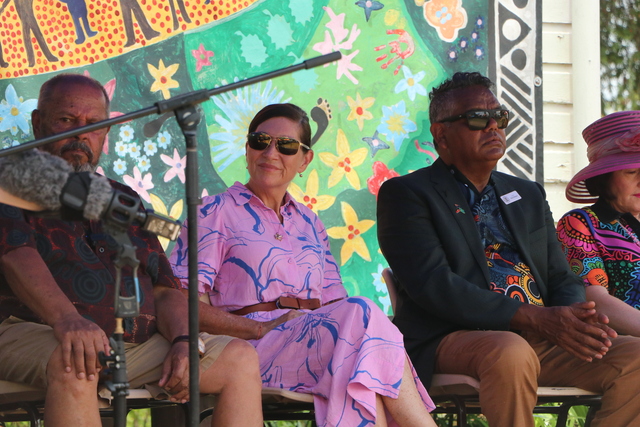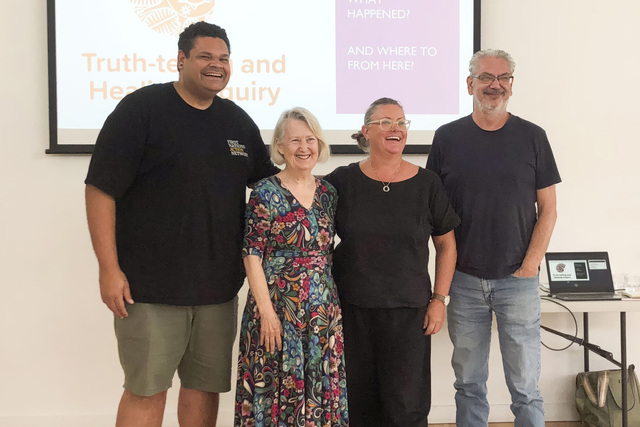
Former Queensland Supreme Court Judge and the only non-Indigenous committee member of the now defunct Truth-telling and Healing Inquiry Roslyn Atkinson spoke about the Inquiry at the Noosa First Nations Allies (NFNA) AGM this month, as Noosa Today’s Margie Maccoll reports.
The Inquiry was begun on 1 July 2024 and shut down in November upon the change of government at the last state election.
Ms Atkinson joined fellow special guests First Nations Action Network founder and executive director Stephen Mam and former Yes23 Queensland coordinator and First Nations justice director at GetUP! Jason Field who co-hosted the event with NFNA Chair Sharon Wright.
Ms Atkinson told the group growing up in Kingaroy and going to a school with Aboriginal families had exposed her firsthand to the racism they had to deal with, which had a strong effect on her as a child and set her on a path to devote her life to justice and dealing with injustice.
As an adult she became a teacher, an actor and a mother before doing a law degree, becoming a barrister, the first president of the anti-discrimination tribunal in Queensland and a judge for 20 years on the Queensland Supreme Court.
Ms Atkinson was one of five members appointed to the Truth-telling and Healing Inquiry, set out under the Path to Treaty Act 2023, with barrister and chair Joshua Creamer, judicial registrar to the Federal Court of Australia Ivan Ingram, activist for Aboriginal rights Cheryl Buchanan and former Torres Strait Regional Authority CEO Vonda Malone.
Sections of the Act provided that the Inquiry had to act independently and in the public interest, having particular regard to the interests of Aboriginal peoples and Torres Strait Island peoples and provided a guide to the inquiry with the following functions:
– to conduct inquiries into and document the individual, familial, cultural and societal impacts and effects of colonisation on Aboriginal peoples and Torres Strait Islander peoples by holding truth telling sessions, truth telling hearings and inviting persons to bring documents and other things to the inquiry.
– to conduct research into and promote community awareness and understanding of the impacts and effects of colonisation on Aboriginal peoples, Aboriginal law and Aboriginal tradition and Torres Strait Islander law and custom and the general public shared understanding of history of Queensland to provide advice and make recommendations to the Minister in accordance with our terms of reference, Ms Atkinson said.
What is truth telling and why is it important?
“Truth telling is an accurate and inclusive account of Queensland’s history,“ Ms Atkinson said. “It recognises the contributions of Aboriginal peoples and Torres Strait Islander peoples to Queensland history and records their experiences of colonisation in our state. It allows us to reflect on Queensland’s history and see the facts of the impacts of colonisation. This means exploring laws and practices and policies and looking at the affects these had and continue to have on Aboriginal peoples. Truth telling is important because it shares many perspectives. It was envisaged that truth telling would complete the picture of Queensland’s history as we build together an inclusive future for all Queenslanders and that truth would allow Queenslanders to heal and move forward with respect.“
Ms Atkinson said all Inquiry members shared Joshua Creamer’s vision as set out in his introduction to its first and only report.
“He said the inquiry had a role to strengthen the relationship between non-Indigenous and Aboriginal peoples and Torres Strait Islander peoples, to foster reconciliation and a deeper respect for Aboriginal and Torres Strait Islander culture, history and experiences that transcend generations,“ she said. “The Inquiry was about unity and reconciling to a unified Queensland based on a shared understanding of a full and complete history of Queensland.“
What did they achieve?
“We commenced consultations in preparation for the first community truth telling sessions and hearings,“ Ms Atkinson said. “Consultation was critical to doing the job properly.
“We met with Queensland State Archives and identified over 200,000 items and 4000 visible artefacts held by the archives relevant to the inquiries’ terms of reference.
“Because First Nations peoples were covered by the Act there is very careful documentation of what happened to them. It’s really quite extraordinary.
“We held a ceremonial hearing attended by over 2000 people in person and online. We held our first truth telling hearing in Meanjin where we heard evidence from seven participants who shared evidence with their lived experience, experience of their families and the research work.
“We held a truth telling session with government representatives with submissions received from 14 government entities and oral testimony from six directors general and the Queensland police commissioner.
“We invited over 430 community organisations to provide submissions in preparation for planned truth telling sessions over the coming months.
“We held community events, met with elders, community leaders, businesses and community groups and government representatives to raise awareness about the inquiry’s work. We raised awareness about the inquiry’s work and Aboriginal and Torres Strait Island culture through our website which is still there and I invite people to look at it.
“We welcomed 12,000 visitors to the social media site and received almost 1000 media mentions reaching an audience of nearly 30 million people. We were very aware that in telling their story in a sessional hearing people were likely to experience stress and psychological trauma so it was not just a question of sitting down and listening to someone’s story but it was important to provide wrap-around support before, during and after a person’s testimony so it could be a healing process for them and their families and community.
“By giving the wider community an experience to listen to their experiences we could heal together as a community by recognising what had happened in the past and how the trauma of that history reverberates to the current day. Guidelines were developed by the inquiry to ensure the work of the inquiry was culturally responsive, trauma aware and healing informed. The witnesses who gave evidence, it was moving, informative, extraordinary to be part of.
You can still watch their evidence online and I urge you to do so.“
What happened to the planned three year Inquiry.
“The inquiry was unceremoniously shut down upon the change of government. It was done, frankly, showing no respect to the chair, members or staff which was incredibly disappointing. We had done solid work and the anticipation of the healing that was going to be done was very high in Aboriginal and Torres Strait Islander view. In essence the lack of respect was shown to all First Nations peoples in Queensland and in doing so the government squandered the opportunity to trust and respect which is necessary,“ Ms Atkinson said.
So where to from here.
“For First Nations peoples life continues as it always has, the struggle doesn’t stop, the need for recognition cannot stop,“ Ms Atkinson said.
“Unfortunately as I discovered from my colleagues lack of respect is not uncommon. That for me was perhaps the most hurtful thing. Being treated with such disrespect was a bit of a surprise to me. For my First Nations colleagues it is not surprising, they’re used to it. That is disgusting. That is really the essence of it, I think.
“For we who are allies what should we do? We show friendship, we show respect. We should attend Naidoc events. We should listen and show difference and respect. Just remember we live in a nation with the oldest living culture in the world and that is an enormous sense of pride and we have treated the people from that culture disgracefully in the past and that continues today and that is a source of shame.“
Jason Field said after working on an inquiry many years ago that had it’s own truth telling process he had an appreciation of the process and the sense it could deliver of achieving some sort of justice.
“I admire and think these processes are important,“ he said. “It can raise expectation and can be deflating but they are critically important because that’s what people need in order to heal and that must take precedence over everything.“
Stephen Mam said government needed to address what happens now.
He said after the state election Minjerribah held a truth telling run by the community and elders and a session was run by Cherbourg.
“Listening to these hard stories, what struck me was First Nations peoples had never had the opportunity to share these stories, not in this way,“ he said. “We’ve been told not to share these stories, that it was shameful, that it wasn’t of interest, that it wasn’t going to get us anywhere, that if we wanted to be accepted and maintain our relationships with people and positions of power and influence we would have to compromise who we are and our identity. “There is more to be told and as much as it is the non-indigenous community being able to listen and understand, we also need to understand First Nations peoples need to find a way in which they are comfortable in expressing themselves because it’s not easy. Nobody wants to have their story in the public and then not be heard or even worse, misinterpreted.
“I think there’s a lot of work to be done in understanding how we communicate with each other.“
Mr Mam encouraged people to look at the Truth telling and healing Inquiry website.



![[READER COMPETITION] – Win tickets to the Queensland Ballet at The J Theatre](https://noosatoday.com.au/wp-content/uploads/2025/07/Queensland-Ballet-100x70.png)



